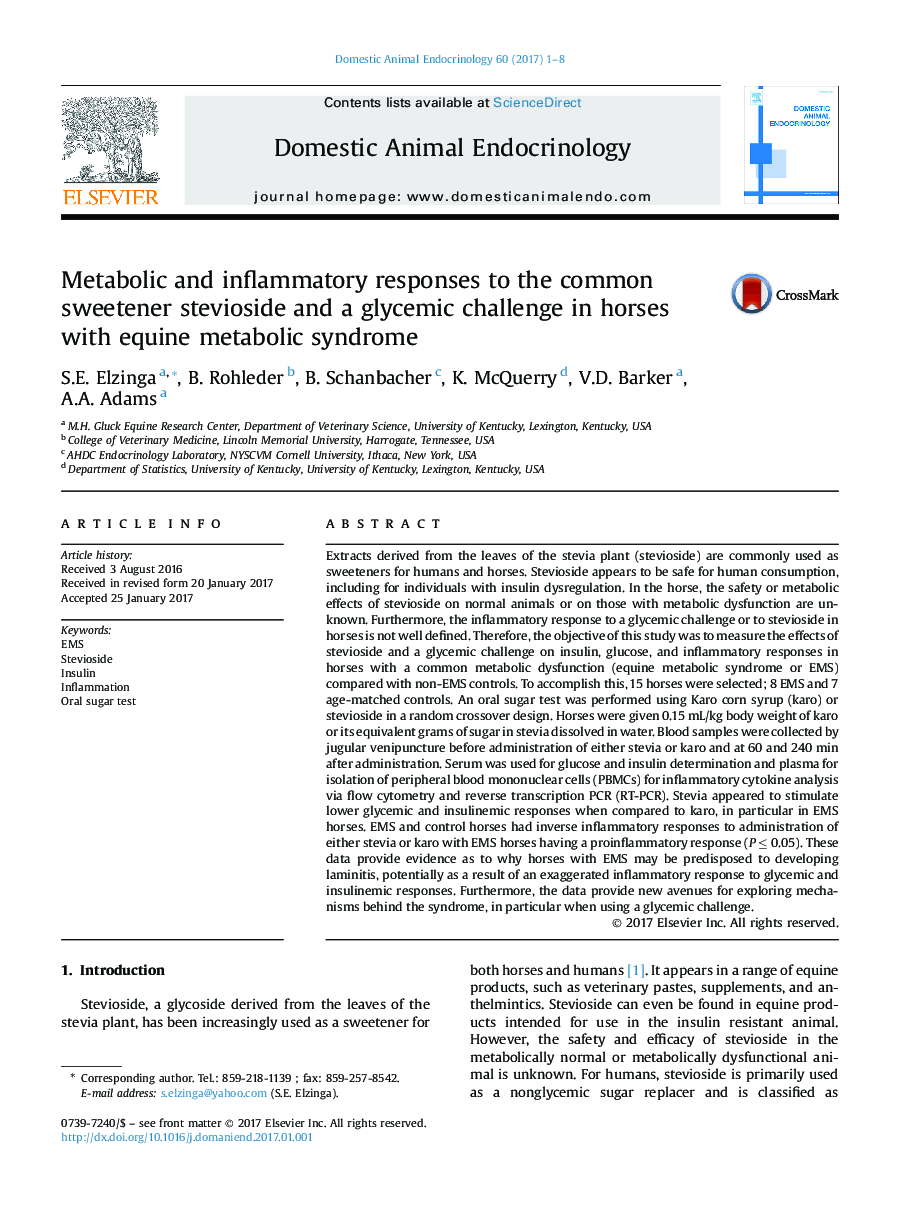| کد مقاله | کد نشریه | سال انتشار | مقاله انگلیسی | نسخه تمام متن |
|---|---|---|---|---|
| 5535374 | 1551499 | 2017 | 8 صفحه PDF | دانلود رایگان |
عنوان انگلیسی مقاله ISI
Metabolic and inflammatory responses to the common sweetener stevioside and a glycemic challenge in horses with equine metabolic syndrome
ترجمه فارسی عنوان
واکنش های متابولیک و التهابی به استوییسید شیرین کننده شایع و یک چالش گلیکوزمی در اسب با سندرم متابولیک اسب
دانلود مقاله + سفارش ترجمه
دانلود مقاله ISI انگلیسی
رایگان برای ایرانیان
موضوعات مرتبط
علوم زیستی و بیوفناوری
علوم کشاورزی و بیولوژیک
علوم دامی و جانورشناسی
چکیده انگلیسی
Extracts derived from the leaves of the stevia plant (stevioside) are commonly used as sweeteners for humans and horses. Stevioside appears to be safe for human consumption, including for individuals with insulin dysregulation. In the horse, the safety or metabolic effects of stevioside on normal animals or on those with metabolic dysfunction are unknown. Furthermore, the inflammatory response to a glycemic challenge or to stevioside in horses is not well defined. Therefore, the objective of this study was to measure the effects of stevioside and a glycemic challenge on insulin, glucose, and inflammatory responses in horses with a common metabolic dysfunction (equine metabolic syndrome or EMS) compared with non-EMS controls. To accomplish this, 15 horses were selected; 8 EMS and 7 age-matched controls. An oral sugar test was performed using Karo corn syrup (karo) or stevioside in a random crossover design. Horses were given 0.15 mL/kg body weight of karo or its equivalent grams of sugar in stevia dissolved in water. Blood samples were collected by jugular venipuncture before administration of either stevia or karo and at 60 and 240 min after administration. Serum was used for glucose and insulin determination and plasma for isolation of peripheral blood mononuclear cells (PBMCs) for inflammatory cytokine analysis via flow cytometry and reverse transcription PCR (RT-PCR). Stevia appeared to stimulate lower glycemic and insulinemic responses when compared to karo, in particular in EMS horses. EMS and control horses had inverse inflammatory responses to administration of either stevia or karo with EMS horses having a proinflammatory response (P ⤠0.05). These data provide evidence as to why horses with EMS may be predisposed to developing laminitis, potentially as a result of an exaggerated inflammatory response to glycemic and insulinemic responses. Furthermore, the data provide new avenues for exploring mechanisms behind the syndrome, in particular when using a glycemic challenge.
ناشر
Database: Elsevier - ScienceDirect (ساینس دایرکت)
Journal: Domestic Animal Endocrinology - Volume 60, July 2017, Pages 1-8
Journal: Domestic Animal Endocrinology - Volume 60, July 2017, Pages 1-8
نویسندگان
S.E. Elzinga, B. Rohleder, B. Schanbacher, K. McQuerry, V.D. Barker, A.A. Adams,
